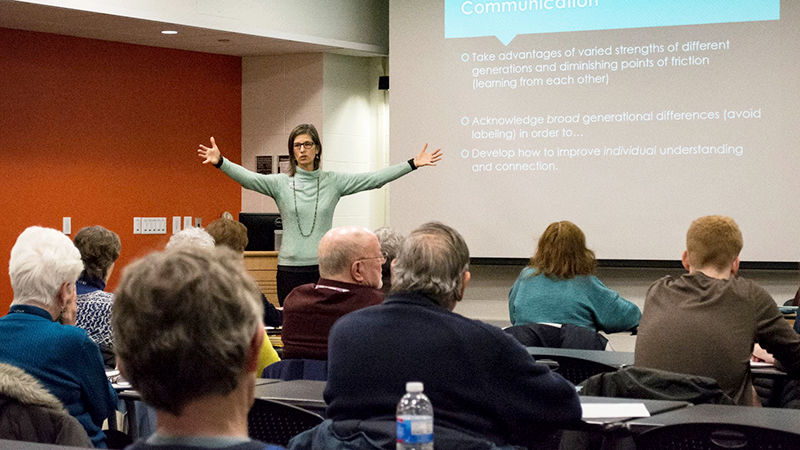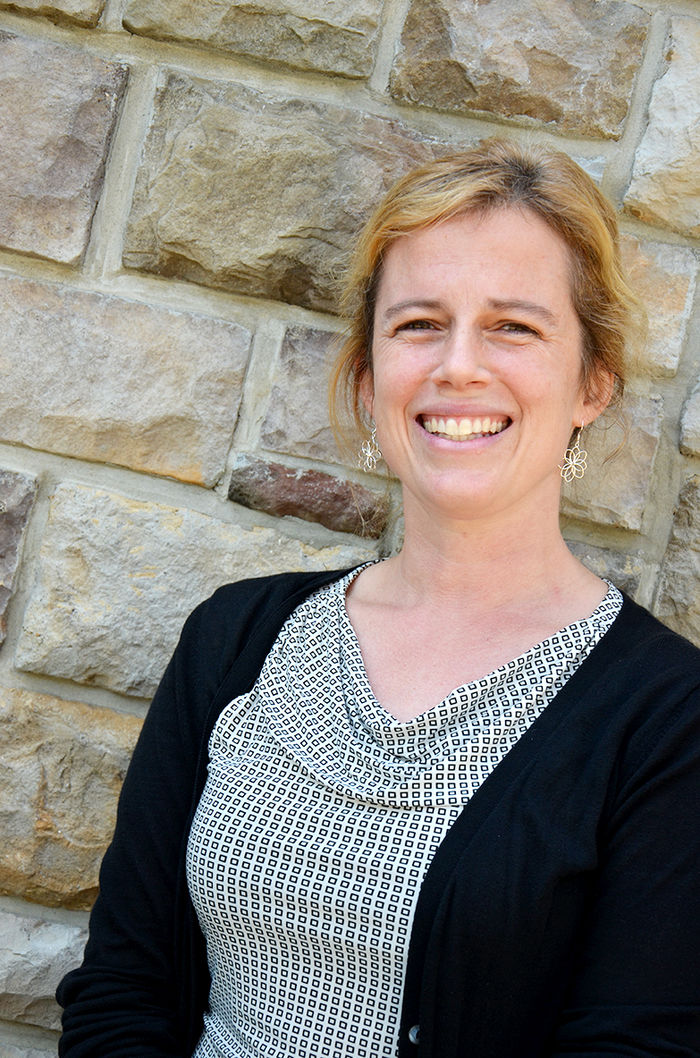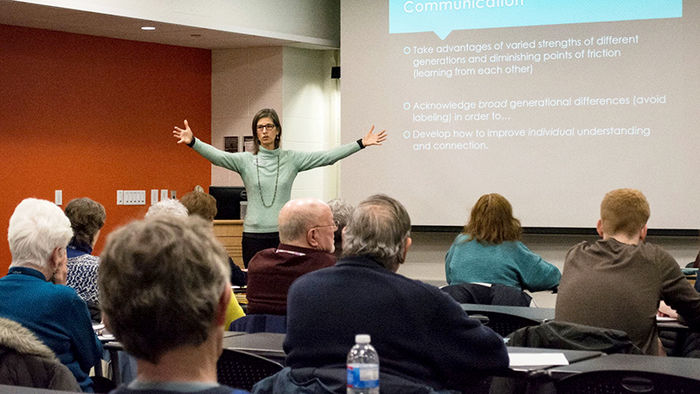

This dialog contains the full navigation menu for this site.

Education is the best provision for old age. —Aristotle
By the age of 60 Harold Woodruff had been a teacher (elementary school and then high school industrial arts), and, when he “needed to take a break from teaching,” he says, he became a machinist and then a numerical controlling programmer/machine operator. His last job before retirement was coordinator of lending services for students with disabilities at the Penn State Libraries. He had also served in the army and acquired both bachelor’s and master’s degrees. He cared for his mother when she had dementia. He retired but that didn’t stop him. He started distance running, a pastime from his younger years. He ran races. And he went back to school.
“I’ve been a college student for 60 years,” Woodruff says. “I got a bachelor’s degree in 1967, a master’s in '91. I accumulated 275 earned credits and then I got into the Go-60 program,” where Pennsylvania residents over 60, as well as former students and employees, have the opportunity to take courses at Penn State without paying tuition. Woodruff remembers his initial options for participating: “They had a list of 20 courses you could choose from, free. I took courses that way and then I kinda let it go for a while.” But he wasn’t finished with his education.

Kelly Munly, assistant professor of human development and family studies
When Kelly Munly, assistant professor, human development and family studies, first came to Penn State Altoona in 2015, she had many goals, one of which was “to make our campus age-friendly.” For a university to become “age-friendly” means more than just offering a few free classes for those over 50; it means going all-in with education and inclusiveness. Becoming a part of the Age Friendly University Global Network requires adopting 10 principles, such as welcoming older people “in all the core activities of the university, including educational and research programs.”
At a statewide HDFS meeting in State College Munly found a like-minded colleague in Amy Lorek, assistant research professor at the Center for Healthy Aging at University Park, who spoke at the meeting. “She was telling us about the latest university initiative for age-friendliness,” Munly says. While the university has not yet become part of the AFU Global Network, Lorek “encouraged us to move in that direction—to go for it—and also be communicative with our chancellors about it.”
Munly took the ideas to heart. She was already teaching a course titled “Perspectives on Aging” (HDFS 434/SOC 435/WMST 497) at Penn State Altoona to “examine demographic, social, historic, and cultural factors affecting older adults and their quality of life in the United States.” According to her syllabus, “After taking this course, you will be able to embrace old age content and/or human services work with a greatly enhanced critical perspective on numerous issues of importance to our nation’s older adults.” The course was aging-positive but not yet truly “age-friendly.”
With Lorek’s “mentoring and guidance,” Munly says, she made some changes to her class. “Amy really guided both me and our campus.” Lorek put Munly in contact with the Osher Lifelong Learning Institute (OLLI) through University Park and “she organized conference calls with the OLLI staff and shared her experiences about her own courses with me.” The big change Munly then made was opening her course to OLLI participants interested in intergenerational learning.
One of those “older adults” she asked was Woodruff, a big fan of intergenerational learning, who had picked up his education efforts again by joining OLLI’s writing program. That program prompted him to write an article about running in a local magazine and newspaper, his first published article. About OLLI he notes, “There are all kinds of things people my age like to do,” but he likes the educational opportunities best. Woodruff is enrolled in OLLI through University Park; Penn State Altoona does not yet have an OLLI program but, according to Lorek, inviting OLLI participants into Altoona classrooms is a step in the right direction.
Both traditional students and OLLI participants in Munly’s spring 2020 “Perspectives on Aging” class at Penn State Altoona—in person and then via Zoom—discussed a vast array of topics that affect older people. “We looked at spousal caregiving across genders—it’s interesting to look at men and how good they can be,” Munly says. “Something students don’t automatically think of is romance and sex lives and how older adults navigate them. One can look at the benefits of online dating or the experience of aging for sexual minorities.” And, fittingly, “at the end of the semester, we looked at retirement.”
Munly selected these subject areas carefully, knowing that “these topics are relevant to numerous jobs in long-term care, social work, family counseling, family medicine, and business and design efforts serving older adults’ interests”—in other words, treating older adults as full human beings. She knows that college-age students’ exposure to older people—other than possible internships or volunteer work—might be as limited as visiting their own grandparents. Bringing OLLI students into the class brings a perspective young people may not get in another way.
Lorek not only preaches intergenerational learning, but she also teaches it. “Very few students interact with older adults so they don’t think about aging and they don’t know how to communicate with older adults very well,” she says. To help change that dynamic, “this spring I taught ‘Teaming Up: Skills for Navigating a Multigenerational World.’” Like Munly, Lorek recruited older adults through OLLI so that they could share their work experiences with the college students. “These days there are five generations in the workplace. That’s never been true before. The notion of being able to talk to people of different ages, people at different stages of life ... perspective exchange has value at any age.”
Woodruff has been in three of Lorek’s classes at University Park and, he says, “I’ll probably be there again.” He makes it clear that he enjoys the multi-age experience. “I’ve always been in contact with younger people. I get along with people my age but I don’t relate to people my age.” Lorek appreciates his approach: “He has something to offer students—a different perspective that students find fascinating and reassuring.”

Assistant Research Professor Amy Lorek in the classroom
Lorek sees progress toward that “age-friendly campus” goal for the university. “Essentially we’ve built more infrastructure and more opportunities for intergenerational interaction. Kelly has embraced that and welcomed it in her classroom. It’s a wonderful expansion of the commonwealth campus. But we’re still making inroads. Our goal is age-friendly from welcoming older adults in the class to making room for them in every classroom.”
That goal is shared by Penn State Altoona Chancellor and Dean Lori Bechtel-Wherry. She makes it clear that she understands the value of an age-diverse campus when she says, “Penn State Altoona welcomes students of all ages to study and learn at our college.” Study and learn—and graduate! “A few years ago we had an 84-year-old woman who graduated from our college, and each of our graduating classes typically has dozens of adult learners.” The campus may not yet have the official designation of “age-friendly” but, as Bechtel-Wherry says, “We encourage and welcome learners of all ages to join our campus community. Learning is a life-long process!”
According to the US Census Bureau, the number of Americans over 65 will almost double in the next 40 years. But education doesn’t have to end at retirement—with efforts such as OLLI, “age-friendly” campuses, and intergenerational learning that Munly and Lorek are committed to, older adults can continue learning. College students, especially those who plan to work with this age group after graduation, also benefit from exposure to and interaction with older adults in the classroom. More than age-friendly—it’s life-friendly.


